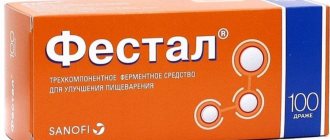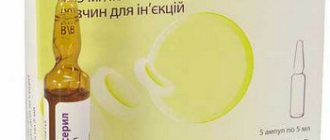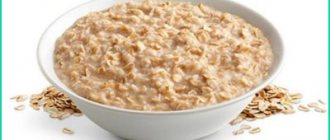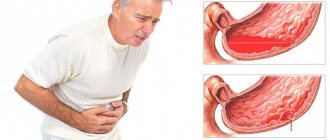Currently, the etiology of gastritis has been studied more fully than several years ago. Scientifically proven facts confirm the predominantly bacterial origin of the disease. Generally accepted aspects, such as non-compliance with the principles of a healthy diet and lifestyle, have only a minor impact on the development of pathologies of the digestive tract. Adequate treatment of gastritis includes not only adherence to a well-structured diet from a medical point of view, but also taking medications that inhibit pathogenic microorganisms and restore and normalize the natural microflora of the stomach.
Taking pills is a necessary measure in the treatment of gastritis
Composition and release form
The drug Festal represents the clinical and pharmacological group of enzyme drugs. The medicine is produced in the form of a white dragee, with a shiny protective film and a slightly vanilla odor.
Thanks to the special shell, the enzymes remain protected from the negative effects of gastric juice and penetrate the small intestine. The drug is able to quickly eliminate unpleasant phenomena associated with disruption of digestive processes.
Festal helps dilute fats with water and improves their digestibility. Indicated for use in pancreatitis, liver damage, loss of bile acid, disorders of bile formation, bile excretion, diseases of the gastrointestinal tract.
| Active substance | The drug contains several main active ingredients, their content in one tablet is:
|
| Additional composition | cellacephate, sucrose, ethylvanillin, castor oil, methylparaben, macrogol, liquid dextrose, propylparaben, gelatin, talc, calcium carbonate, glycerol, titanium dioxide. |
| Release form |
|
The role of enzymes and bile
Pancreatic enzymes play a vital role in the digestion process. Normally, they pass through the duct, where they mix with bile, into the small intestine and are directly involved in the breakdown of nutrients. Food in the small intestine is processed by a mixture of enzymes and bile, where fats are emulsified and broken down.
With insufficient production of bile and enzymes, digestion is disrupted: nutrients are poorly absorbed, the absorption of certain foods is impaired, putrefactive processes and fermentation can begin in the intestines. All this cannot but affect a person’s well-being.
A deficiency of pancreatic enzymes can occur as a symptom of pancreatic disease. Disturbances in the production of bile can be either a symptom of diseases of the liver, gallbladder, stomach and intestines, or occur in people with healthy digestive organs due to poor nutrition, sedentary lifestyle, forced immobility, for example, after injury or surgery.
Festal contains pankeatic enzymes and bile components, which compensate for the lack of these substances when they are insufficiently produced by the body, and help normalize digestion.
pharmachologic effect
Festal is of natural origin, made from bovine bile and contains all the enzymes necessary for digestive processes (hemicellulase, amylase, lipase, protease).
The dragee has lipolytic, amylolytic, proteolytic, choleretic and pancreatic-normalizing effects.
- Pancreatin in Festal is one of the main active ingredients of the drug; it contains lipase, protease and amylase, penetrates the small intestine and excellently promotes the rapid breakdown, absorption and excretion of carbohydrates, fats and proteins.
- The enzyme hemicellulase, which is found in tablets, accelerates the process of digestion of plant fiber and thus increases digestive functions and reduces the formation of gases in the intestines.
- The presence of bile acids provides additional opportunities for correcting biliary insufficiency, which often accompanies chronic pancreatitis.
- Bile extract has a choleretic effect, facilitates the absorption of fats and fat-soluble vitamins A, E and K, and promotes the secretion of lipase by the pancreas.
- The enzyme hemicellulase promotes the breakdown of plant fiber, which also improves digestive processes and reduces the formation of gases in the intestines.
Before using Festal, carefully read the instructions for its use. See the expiration date of the drug.
Gastritis with low acidity
Gastritis with low acidity is characterized by the absence in gastric juice of a sufficient amount of enzymes responsible for the high-quality breakdown of food. The main medicine that must be taken in the presence of this pathology is an artificially created analogue of natural gastric juice. The substances included in its composition, such as hydrochloric acid and pepsin, stabilize the activity of the stomach and normalize the processes of food digestion. It is also recommended to take medications that enhance the production of gastric juice. These include, for example, Pancreatin and Festal.
What Festal helps with: indications for use
Taken as an aid to improve the functioning of the digestive system
When there are not enough enzymes in the body, the normal functioning of the gastrointestinal tract is disrupted and symptoms such as burning, nausea, diarrhea and, in some cases, vomiting occur. With such manifestations, there is a need to help the gastrointestinal tract and take medications.
What do pills help with? The main indications for the use of Festal are insufficiency of the pancreas, accompanied by chronic pancreatitis, as well as biliary insufficiency with impaired digestion of food, flatulence, constipation, and so on.
Main indications for the use of tablets for adults:
- disorders of the liver and biliary tract, dyskinesia or dysbacteriosis, cirrhosis;
- diagnosed insufficiency of exocrine pancreatic function;
- sedentary lifestyle or impaired chewing function;
- the need to prepare for an ultrasound or x-ray of the abdominal organs.
The use of Festal is also justified in the case of combination therapy after irradiation of the digestive tract, which led to disruption of the functioning of these organs.
The drug is used with caution in case of concomitant cystic fibrosis, as well as during pregnancy. Before starting to use Festal tablets, it is important to exclude the presence of contraindications.
Festal - what is it?
This is a drug popular with doctors. Festal belongs to the group of enzyme drugs. It is taken if the body does not produce enough secretions from the pancreas and liver. 1 tablet of the product will help relieve heaviness in the digestive tract. Thanks to 1 tablet, the stomach and intestines will be able to cope with the incoming food and digest it to the elements necessary for absorption.
Treatment for heartburn does not begin with the use of appropriate medications. First of all, the gastroenterologist will prescribe general measures:
- Need to lose weight. Extra pounds interfere with the normal functioning of the internal organs responsible for digesting food.
- Try not to eat before bed. After dinner you can go to bed 2-3 hours later.
- Clothes are loose, no constriction.
- Try to purchase shoes that do not require lacing.
- The procedure for putting on shoes should be done in a squatting position, without sudden bending forward.
- Remove foods that cause heartburn from your diet.
- During sleep, the head should be elevated relative to the body.
Instructions for use
Before starting to take Festal tablets, it is important to carefully read the instructions for the drug and pay attention to several features of the correct use of the drug.
The tablet must be taken with meals or at the end of a meal. Take the product with a small amount of water without chewing. For the adult population, tablets are prescribed in a dosage of 1 or 2 tablets three times a day. If necessary, the dose can be increased, but only on the recommendation of a doctor.
- For adults, Festal is prescribed in a dosage of 1-2 tablets after or during meals. Should be used three times a day.
- If Festal is prescribed to prepare for hardware diagnostics, it is taken for 3 days before the examination, 2 tablets 3 times a day.
The duration of treatment can vary from several days (if the digestive process is disrupted due to errors in the diet) to several months or years (if constant replacement therapy is necessary).
The drug is given to children only as prescribed by a doctor. It also determines the method of use of the drug.
Differences and similarities between the two drugs
Creon and Festal have the following differences:
- Release form. Festal is produced in the form of dragees, and Creon is produced in the form of enteric-coated capsules.
- Therapeutic influence. Creon is more advanced, because its granules are broken down directly in the intestines, which increases the effectiveness of treatment.
- Substances included in the composition. The dosage of the German drug is indicated on the packaging. With Festal, the exact dosage of components varies, which is not always indicated on the insert.
- Indications. Creon has a much wider list of them than Festal.
- Contraindications. Creon has a smaller list, which indicates the safety of the drug.
- Use in childhood. Creon is approved for the treatment of gastrointestinal diseases in children over 2 years of age. Festal can be prescribed to patients over 3 years of age and only under the supervision of a doctor. This once again confirms Creon's safety.
- Efficiency. In Creon it is higher than in its analogue, because it begins to act already in the intestines. Under the influence of gastric juice, some of Festal's enzymes are destroyed, so the medicine does not penetrate into the intestines in full dosage. Although in Festal the amount of the active ingredient is higher than in Creon.
- Manufacturer. Creon is produced in Germany, and Festal in India.
- Price. The cost of Creon is more expensive, so during long-term treatment, the purchase of this drug can significantly hit the budget.
Creon is more advanced, because its granules are broken down directly in the intestines, which increases the effectiveness of treatment.
The dosage of the German drug is indicated on the packaging. With Festal, the exact dosage of components varies, which is not always indicated on the insert.
Creon has a smaller list of contraindications, which indicates the safety of the drug.
Creon is approved for the treatment of gastrointestinal diseases in children over 2 years of age. Festal can be prescribed to patients over 3 years of age and only under the supervision of a doctor.
Creon's effectiveness is higher than that of its analogue, because it begins to act already in the intestines. Under the influence of gastric juice, some of Festal's enzymes are destroyed, so the medicine does not penetrate into the intestines in full dosage.
The cost of Creon is more expensive, so during long-term treatment, the purchase of this drug can significantly hit the budget.
When considering which is better - Festal or Creon, it is necessary to note the commonality between them - these are the features of administration and indications for treatment.
Contraindications to the use of Festal and Creon
Festal is prohibited for use in the following cases:
- intolerance to components;
- pancreatitis in acute or chronic form in the acute stage;
- liver disease, precoma, coma;
- hepatitis;
- hyperbilirubinemia;
- obstructive jaundice;
- cholelithiasis;
- empyema of the gallbladder;
- intestinal obstruction;
- frequent diarrhea;
- age up to 3 years.
How to take Creon 10,000 for adults and children?
Pharmacy pharmacy Part 3. Enzymes. Pancreatin Festal Mezim
Creon is contraindicated:
- with individual intolerance;
- in acute and chronic forms of pancreatitis in the acute stage.
Side effects of Festal and Creon
When using Festal, the following side symptoms may develop:
- diarrhea, intestinal colic, nausea;
- allergies: lacrimation, skin hyperemia, sneezing;
- prolonged use of the drug leads to increased levels of uric acid in urine and blood;
- In children, when using the medication, irritation of the mucous membranes in the mouth and anus is possible.
When using Festal, the following side symptoms may develop: diarrhea, intestinal colic, nausea.
Long-term use of the drug Festal leads to increased levels of uric acid in urine and blood.
When taking the German enzyme, the following adverse reactions occur: abdominal discomfort, nausea, diarrhea.
When taking the German enzyme, the following adverse reactions occur:
- diarrhea;
- constipation;
- abdominal discomfort;
- nausea.
Directions for use and dosage
These medications should be taken 1-2 tablets 3 times a day after meals.
The duration of the therapeutic course is determined by the attending physician.
Indications for use of Festal and Creon
The main indication for the use of Festal remains a decrease in the number of secretory cells of the pancreas. The drug is also part of complex therapy for the treatment of:
- liver damage from toxic foods or alcohol;
- loss of bile juices after surgery to excise the gallbladder;
- problems in the circulation, formation and separation of bile acids.
These medications should be taken 1-2 tablets 3 times a day after meals.
The drug Festal is also part of complex therapy for the treatment of liver damage from toxic products or alcohol.
The drug Creon is indicated for use in cases of indigestion of food, gastrointestinal diseases, insufficient functioning of the pancreas, etc.
The German drug is indicated in the following cases:
- insufficient functioning of the pancreas;
- indigestion of food;
- gastrointestinal diseases;
- rehabilitation period after surgery on the digestive organs;
- rehabilitation period after exacerbation of chronic pancreatitis.
Pharmacological effects
The main purpose of the medications presented is the complete and rapid digestion of food. They eliminate unpleasant phenomena that arise as a result of digestive disorders, including:
- bloating;
- feeling of heaviness and fullness in the stomach;
- diarrhea;
- feeling of lack of air;
- dyspnea, which occurs due to the accumulation of gases in the intestines.
The main purpose of the medications presented is the complete and rapid digestion of food.
They eliminate unpleasant phenomena that arise as a result of digestive disorders, including: diarrhea, bloating, a feeling of heaviness and fullness in the stomach, etc.
It should be noted that Creon is a more effective and convenient drug. Its capsules deliver beneficial substances directly to the place where they are needed.
Contraindications
There are a number of pathological and physiological conditions of the patient’s body that are contraindications for taking Festal tablets, these include:
- acute pancreatitis;
- exacerbation of chronic pancreatitis;
- liver failure;
- hepatitis;
- jaundice of mechanical origin;
- cholelithiasis;
- empyema of the gallbladder;
- intestinal obstruction.
Given such a number of contraindications, you cannot prescribe self-treatment with Festal.
Festal for children and pregnant women
Festal can be taken by pregnant women, but you should consult your doctor.
Festal can be given to children only on the recommendation of a pediatrician. Caution should be exercised when treating children under 3 years of age. Children with disorders of the pancreas and gallbladder are prescribed enzymes as replacement therapy.
A child over 3 years old is able to swallow the tablet completely, then the effect will be achieved because it will not dissolve in the gastric juice, but will enter the small intestine, where its effect will be most beneficial.
Young children may not be able to swallow the tablet whole, so it is recommended that it be crushed and mixed in breast milk or juice.
The efficiency in this case is significantly reduced. The dosage of the drug is selected individually depending on the diagnosis, weight and age of the child. Festal should not be given to a child for prevention without the recommendation of a pediatrician.
During pregnancy, digestion is often disrupted. The growing fetus puts pressure on the organs, the outflow and production of bile may be disrupted. Digestive enzymes are not contraindicated in pregnant women, but they should be taken with caution and consult a doctor.
As the child grows, digestive problems may worsen due to the growing uterus and the production of hormones that relax smooth muscles and reduce the acidity of gastric juice. Enzymes are often prescribed to women who already had chronic diseases of the pancreas and gallbladder at the beginning of pregnancy.
Despite the safety of the drug, the doctor will first adjust the diet and only if the potential benefit for the mother and child outweighs the risk, will he prescribe enzymes. Medicines of any composition during pregnancy are prescribed only if absolutely necessary. Festal is taken in short courses during pregnancy, but not continuously to avoid overdoses and side effects.
Noticed a mistake? Select it and press Ctrl+Enter to let us know.
Festal is an enzyme preparation. It is produced in dragees, which are covered with an enteric coating. It is prescribed to improve digestion and eliminate heaviness in the stomach. But you need to know not only the indications for the use of Festal, but also its contraindications and undesirable effects.
Analogs
Nowadays, there are a number of similar products belonging to the group of enzyme products. Those who are constantly forced to take Festal must remember that, despite the interchangeability of some enzyme medications, there is no need to switch to a new drug on your own without consulting a doctor.
Festal's analogues:
- enzistal,
- digestal,
- normoenzyme.
If the presence of pancreatin in the composition is important, then the following drugs are recommended:
- pancreatin,
- mezim,
- Creon.
The enzymes included in Festal and its analogues facilitate the absorption of proteins and carbohydrates in the small intestine, promote the breakdown of fiber, which improves the digestion process and reduces gas production in the intestines, have a choleretic effect, and improve the absorption of fats and fat-soluble vitamins.
Do not decide to replace pills on your own; consult your doctor.
Side effects
The doctor should warn that taking Festal may cause negative side effects. In particular:
- stomach ache;
- diarrhea;
- vomiting;
- constant feeling of nausea;
- decreased natural production of bile acids and enzymes;
- allergic reactions;
- increased levels of uric acid in the blood and urine, which increases the risk of kidney stones.
So, despite the fact that gastritis is not a direct indication for taking Festal, this drug can be used in the complex treatment of the disease. The purpose of prescribing the drug is to improve the digestion process and absorption of nutrients. It is strictly not recommended to use Festal for self-medication, since improper use can be harmful to health.
Prices in pharmacies
- The average price for the drug in Russia is about 250 rubles.
- On the territory of Ukraine, the average cost will be about 92 hryvnia.
Amiksin - instructions for use of tablets, analogues, indications for adults and children
Previous entry
Gastroduodenitis - what it is, causes, signs, symptoms, treatment in adults and diet
Next entry
Causes and treatment of heartburn
The mechanism of heartburn is due to a combination of two factors: an increase in the secretion of hydrochloric acid in the stomach and pathological disorders that contribute to its reflux into the esophagus:
- incompetence of the esophageal valve with reflux esophagitis,
- increased intra-abdominal pressure due to flatulence, abdominal dropsy (with severe liver diseases),
- decreased tone of the smooth muscles of the esophagus.
Heartburn occurs with ulcers of the stomach and duodenum in acute phases, in people with high acidity of the stomach, and with gastritis. A burning sensation behind the sternum may occur due to pancreatic juice and bile entering the esophagus.
Treatment of heartburn as a symptom is to suppress increased gastric secretion. To do this, use short-acting drugs that relieve burning in the abdomen and chest 15-30 minutes after taking the medicine.
However, the medicine does not treat the disease itself, as a result of which an unpleasant symptom periodically occurs. Depending on the etiology of the disease, complex therapy is prescribed aimed at eliminating its symptoms.
Are there any health risks with uncontrolled use of Festal: doctor’s answer
The medication is characterized by a high safety profile. The active compounds act in the intestinal lumen and are not absorbed into the blood. Uncontrolled use, incorrect dosage, regimen (used too often) or a long course increase the risk of developing negative consequences, which include:
- Allergic reactions.
- Increased dyspeptic symptoms.
- Violation of the functional state of the pancreas, which can provoke the development of chronic pancreatitis in the future.
To always avoid risks, the drug for course treatment should be used only after a doctor’s prescription.
How to fight heartburn?
To eliminate the unpleasant burning sensation, antacids are usually used. They can be produced in the form of tablets, solutions, powders, gels and suspensions. Antacids in tablet form are in greatest demand due to their ease of use.
Antacids are either absorbable or non-absorbable. The first category provides a quick but not long-lasting effect. Within 20-30 minutes the symptom may appear again. In addition, when taking absorbed antacids, carbon dioxide is released, which comes out of the esophagus through belching and leads to bloating.
Non-absorbable agents take longer to act; you will have to wait about an hour, but the effect of taking them can last 1-3 hours. In addition, they have fewer side effects.
Absorbable drugs include drugs whose active ingredients are magnesium and/or calcium carbonate. Non-absorbable antacids contain aluminum phosphates (Phosphalugel), a combination of magnesium and aluminum (Almagel), alginic acid salts.
Note: one of the effective remedies for heartburn is Gastal. Due to the similarity of the names, Festal is often taken for heartburn instead of Gastal, but, having not received the desired effect, they give the drug a low rating.
Festal is not a medicine prescribed for heartburn. But taking it improves digestion, making unpleasant symptoms, including heartburn, much less likely to occur. There is no point in waiting for the burning sensation behind the sternum to go away after taking Festal. If you need emergency help, it is better to take an antacid.
Source: ProZKT.ru











